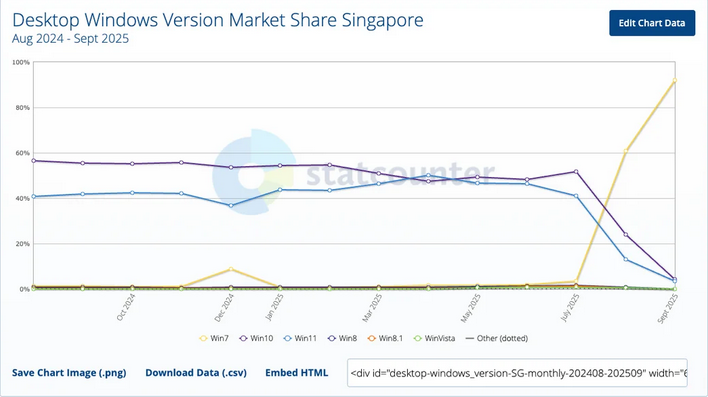

I wish it was only limited to support forums. I’ve seen a Linux kernel driver where the Issues sections was closed and you should go to Discord instead. No thanks.


I wish it was only limited to support forums. I’ve seen a Linux kernel driver where the Issues sections was closed and you should go to Discord instead. No thanks.


Even worse, those stats are also probably just a leftover from a giant spike coming from Singapore around that time:

That one eventually got cleaned up, although a lot of the spillover into other countries remains.
I did some math at the time, and it must’ve been about 1000 fake machines for every real one. And considering this was kept online for several weeks despite making news: Yes, stop using statcounter.


Depends. This happened at a German conference and I assume that this person is most likely German as well. Probably shouldn’t think about getting anywhere close to the US though.
There’s still the possibility of facing prosecution in Germany. Not sure how probable that is though.


Em dashes, weird quote marks are always a giveaway
In a random comment or blog? Sure. In a professionally proofread document? No, adding those might as well be part of the job description. After all, the LLMs picked also have to have picked that behaviour up from somewhere.
Anyway, OP should have included the source, but it can be found pretty easily: https://bsky.app/profile/sanders.senate.gov/post/3m7izwntr322z


What I don’t understand is why the person that owns the device wrote the following in their blog post:
How could a simple IP block disable a vacuum cleaner that is supposed to work offline as well? - Source
This seems like that device was sold to him as “offline” capable. Where does that claim even come from? From a cursory glance I don’t see that product advertised that way anywhere.
Now, I’d be totally in favor that such devices working offline should be the norm, but then again, the person writing the blog should know how these devices currently work.


My assumption is that it probably uses the same mechanism that most other SSDs already have where it always saves the data with internal encryption and simply overwrites the encryption key when a wipe is requested.
This same mechanism already allows SSDs to be formatted quickly while still being secure without having to zero out everything, which would cause a lot of additional wear.
The additional complete wiping would just be the cherry on top.


First up, this fork is specifically about the Android client, not any other ones.
The fork of that always had some nice mobile battery saving features added, but morr importantly, the original version has been discontinued.


Adding onto that, the app StreetComplete makes contributing stupidly easy. You basically get a bunch of quests generatef around you with missing or potentially outdated data that you can fill in by answering simple questions. Basically Pokemon Go, but infinitely more useful.
Not sure why exactly, but if I had to guess it’s probably a lack of marketing people in the FOSS world in general.
Recently I’ve only really seen recently the End of 10 campaign from the KDE folks gaining a bit of traction, but even that’s more vaguely pointing in the direction of Linux than anything.
From what I gather, the only thing they’ve got going for them is that they’re actually contacting key people to try out the distro, as well as timing that campaign to coincide with the EOL of Win10.
But yeah, so annoying to see when there’s so many better alternatives by better people out there.
As for the latter, I haven’t confirmed this myself, but I’ve been hearing that there’s a lot of curling into bash going on, so yeah.


Over the last year or so NVIDIA massively improved their Wayland support. May not be perfect, may not be as good as AMD, but it usually cones with lass drawbacks than the X11 experience.


Agree. It’s neat for file transfers and simple one-shot backups, but if you’re looking for a proper backup solution then other tools/services have advanced virtually every aspect of backups it pretty much always makes sense to use one of those instead.


Oh please, stop the act, we can see your shitty referral link.
I do think those featues have become pretty common in PC gaming nowadays, which is why I’m more in favor of openSUSE as the beginner distro if I had to pick just one, but sure, let’s put that aside.
When it comes to Linux though I just don’t think there’s a one-size-fits-all distro yet that I can safely recommend to everyone. And getting beginners onto a distro that fits them can greatly benefit their initial experience, so I think it’s worth it to give them a few simple choices. That said, you’re completely right that the way OP tries to explain the differences isn’t how you should do it. Ever. Less choices, less jargon, less mentions of fringe distros. It also doesn’t help that a lot of it seems to be based on hearsay rather than actual first-hand experience.
Do you really want to recommend btrfs to beginners?
I mean, it’s the default on Fedora with all its spins, openSUSE, CachyOS and even SteamOS for its root partition.
So lots of people use it nowadays without even knowing.
Chiming in, I’ll say that I mostly agree with your points, except for one:
Someone who just started looking into switching to Linux is looking for neither X11 nor Wayland support.
They won’t care about X11 vs Wayland, sure. A non-ignorable number of them will care about stuff like HDR or multi-monitor setups where different refresh rates don’t stutter and VRR works, and that’s where proper Wayland support becomes a must.
If you recommend someone a distro that can’t do those things and later have to tell them that they have to switch distros for that chances are high they’ll just go back to Windows.


What’s extra funny is that I already did all of this, and yet, I’ve been informed that my developer account is subject to deletion because I’m not active enough. Since my game does not get regular updates I said F this, let them delete my account. It’s still available for sideload on itch.io anyway. Jokes on me for believing that.
So yeah, it seems like Google is actively hostile towards building a library of software/games that just work and intentionally only wants live service garbage apps on their platform because those make more revenue.
I feel like a big problem is that a lot of people never learned how to learn.
Adding onto your examples, I’ve also heard about a study once where they were given similar basic Excel tasks. However, you didn’t even have to solve the tasks. Instead, just trying to get help from the help function or searching online got you into the highest skill bracket. That bracket ended up being the smallest group.


This, so much. Looking back, it’s just insane that pretty much every program you don’t regularly use will beg for updates on Windows. There are some bandaids like WinGet now that I appreciate, but it’s still nowhere as seamless as when the OS and the whole ecosystem around it are designed with a package manager in mind.
A huge chunk of the time I have to spend on tinkering is probably already saved by me not having to wait for updates.
Same. I always find it weird how apparently most people don’t make use of their own custom feeds and instead rely on r/all, or, even worse, let what they consume be dictated by an algorithm. And this goes far beyond Reddit. This place, YouTube, Twitter/Bluesky and pretty much any of the big platforms.